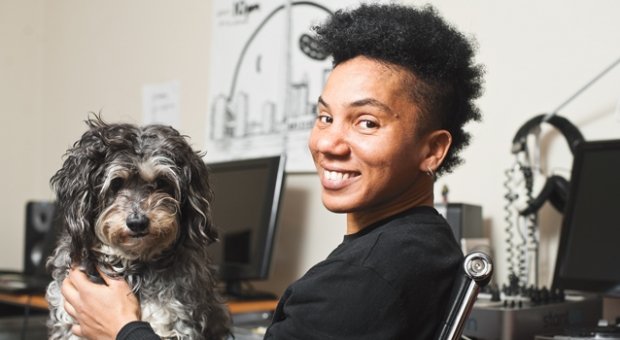
Krystle Merrow and Ailsa Blair host Tits and Toques, a west-end dance party. Credit: N Maxwell Lander
It used to be that the Church Wellesley Village was the natural stomping ground of baby dykes and silver foxes alike. These days, however, it seems it will be only a matter of time before Village lesbians become part of the endangered species list.
Where are all the gay ladies?
Rest assured, they’re still out there. They’re just not willing to restrict themselves to the Village anymore.
“We are getting to the point where we don’t have to be separate,” says Cozmic Cat, co-host of Cherry Bomb, a party for queer women. “People feel safe having parties outside of Church Street.”
Cozmic’s not the only one who believes so.
“I don’t think there’s an area of the city where you can’t be gay anymore,” says Mary Lou Borg, president of CHIC Productions, a women’s entertainment company. How times have changed.
Lesbian-friendly spaces were an anomaly only a few decades ago. In 1976, the Lesbian Organization of Toronto (LOOT) was founded as Toronto’s first lesbian feminist group. LOOT identified several needs amongst the city’s lesbian community, the most pressing of which included a place to meet. The group opened Canada’s first lesbian centre at 342 Jarvis St in 1977. Before closing in 1980, LOOT sponsored a variety of events, including Halloween, New Year’s and benefit dances.
Today, the scene is different. More dances for queer women happen outside the Village than within. Both Cherry Bomb and CHIC Productions dances are hosted at venues beyond the Church Wellesley neighbourhood. The two events got their start in 2007 and today average approximately 400 guests per party.
Location is key to their success.
“There was definitely a need for an alternative hangout spot,” Cozmic says.
Certainly a significant number of queer women live outside the Village today, but that wasn’t always the case.
In 1971, 8,500 people lived within the bounds of Yonge, Bloor, Jarvis and Carlton streets. From 1971 to 1991, there was a significant shift in gender balance. Whereas about 52 percent of residents in the area were female in 1971, 57 percent were male by 1991. The numbers point to the growing dominance of men in the neighbourhood.
Now that women have branched out from the Village, it’s no surprise that they want to attend local events. Fortunately for them, parties are popping up all over the city.
“A lot of women are seizing the opportunity to create their own events,” Borg says.
Queer ladies can enjoy roughly 10 regular dance events in the city, although not all cater to women exclusively. That might not seem like much, but it’s progress. Cozmic says there’s more happening now than five years ago when she and co-host Denise Benson started Cherry Bomb. “There’s a lot going on,” she says. “You just have to be plugged into the scene.”
A closer look at the scene reveals that when it comes to events targeting women, scheduling is paramount. For instance, Cherry Bomb is a monthly event, while CHIC Productions hosts parties every two to three months. Other such events in the city operate at comparable intervals.
This could be the way to go, as keeping up the momentum of a weekly event is no easy task; hosts might not even be rewarded for their efforts.
“I don’t think women would go out that frequently,” Borg says.
Any promoter looking to tackle the lesbian party scene on a weekly basis would need a built-in crowd. More and more, that’s becoming an unlikely reality. “A weekly is hard,” Benson says. “A monthly gives people something to look forward to.”
If successful party hosts won’t venture into holding weekly events, what are the chances others will commit to owning and operating lesbian venues?
Not good.
The hospitality industry is notoriously risky. It’s not made any less so when you make queer women your base clientele.
That was certainly the case for the Rose Café. Located at 547 Parliament St, the venue went by many names throughout the years before developers had it demolished to make way for Cabbagetown homes.
In the early 1980s, the space was a lesbian bar called the Purple Onion. After a run as the Rose it became Pope Joan, from the late 1990s until 2003. Revived briefly as Foxy’s and Coyote’s, the owners decided to close shop in the summer of 2004. The venue simply wasn’t providing enough income as a women’s bar.
“When you start to narrow your niche, it becomes that much more difficult,” Borg says.
Can’t we say the same of gay men’s clubs and bars? Absolutely. But party promoters are quick to point out the differences between men and women.
The Cherry Bomb ladies spin for both queer and straight crowds, and Cozmic has observed that men drop more money at parties than women do. And when women couple up, she says, it’s practically endgame.
“Women find their partner and they disappear,” she says. “Men are not like that.”
Borg agrees. “I don’t think women go out as often as men.”
Is age a factor? Cozmic thinks so. “When you’re 40 and up, you don’t have as much time for partying,” she says.
Life’s responsibilities tend to increase the older one gets. Still, that’s true for both men and women, and in any case, age isn’t an excuse everyone’s using. For her part, Borg says it’s not at all difficult to reach women over 40.
So what else affects attendance?
“Women make less money than men,” Cozmic says.
Ah, money.
The most recent Statistics Canada data show that for every $1 earned by a male worker in Ontario, a woman earns 72 cents. Stats and partying don’t seem like a likely pair, yet they present a reality many women have to live with.
“When you don’t have a lot, you’re not willing to go to the same places over and over again,” Benson says.
Such choosiness comes at the expense of venue owners and party promoters.
“We eat our own by being so fickle,” Benson says.
That doesn’t sit right with Borg. “There are a lot of professional women who come to my events,” she says.
In fact, her business plan counted on those very women becoming regulars. “I wanted to do events for women that were elegant and classy,” she says. “Something that I hadn’t seen in the community.”
Borg does concede that, as a whole, men have more disposable income than women. With her client base, however, she hasn’t really felt the effects of this.
Can newcomers to the party-hosting world hope to be so lucky?
Ailsa Blair and Krystle Merrow of Tits and Toques think so. They premiered the monthly event, based in the Dundas West neighbourhood, in March 2012 but were on hiatus until August.
“The west end seems to be the most vibrant area for queer women in the city,” Blair says.
Tits and Toques is Blair and Merrow’s answer to the need for an indie and alternative dance party in the queer community. “It was getting arduous paying for and waiting in line to dance to music I didn’t love,” Merrow says. “I had to go outside the queer community to find the music I wanted to dance to.”
Upon Blair’s insistence, Merrow got on board with starting an event. “I decided that it was my responsibility to create the night that I longed to go to,” Blair says.
The women decided to keep the dancing to a monthly treat. “I can’t imagine being able to put this event on every week,” Merrow says.
Weekly parties don’t scare everyone off, though; Nikolina Nikolova and Sara Beasley have taken on the challenge. They started Lesbos Thursdays in August and have continued to run the event at Rasputin Vodka Bar. The fact that Nikolova owns the Leslieville bar makes organizing the event significantly easier.
“The east-side ladies showed curiosity and support,” Nikolova says. “We hope that they will take the chance to make Rasputin their home.”
Nikolova’s happy with the turnout so far but admits the event is still building its base. “We have faith that this will come,” she says.
Rasputin Vodka Bar’s been around for about five years. It’s been Nikolova’s experience that the more often an event is hosted, the more challenging it becomes to draw in people.
She says Lesbos Thursdays will be different. “Our lesbo night is not just an event,” she says. “We see it as a gay women’s night that they can call their own.”
Tits and Toques and Lesbos Thursdays are still fairly new events, and their futures are anyone’s guess. What we do know is that throughout the years Toronto has become increasingly gay-friendly, and inclusive dance parties across the city have become popular among queer women. As such, venue owners no longer find it necessary to identify their establishments as strictly lesbian hangouts.
The lesbian nightlife seems set to thrive regardless.
It’s Ladies’ Night
Cherry Bomb, 489 College St
A dance party for queer women and their friends, Cherry Bomb happens the second last Saturday of every month at Andy Poolhall. Attendees fall in the 19-to-45 range. The party starts at 9pm. Cover is free before 10 pm, $7 after.
CHIC Productions, 1601 Lakeshore Blvd W
CHIC hosts women’s only events at the Palais Royale. Most of the crowd is in the 35-and-over age group. Doors open at 8pm. General admission tickets are $20 advance or $25 at the door. VIP tickets are $50.
Tits and Toques, 1532 Dundas St W
A queer/alternative/indie dance party slotted for the first Friday of every month at the Henhouse. The crowd tends to fall in the 20-to-30 range. The event starts at 10:30pm. No cover.
Lesbos Thursdays, 780 Queen St E
Every Thursday night at Rasputin Vodka Bar. The party features rotating female DJs. Most in the crowd are in their mid-20s and above. Dancing starts at 10pm. No cover.
Sapphic Aquatica, 231 Mutual St
Sapphic Aquatica is a monthly women’s night at Oasis Aqualounge. Held on the last Tuesday of every month, the event encourages women to have fun while safely exploring their sexuality in the club’s spa facilities and playrooms. The fun starts at 8pm.
Toronto Drag Kings, 72 Carlton St
The Toronto Drag Kings perform at Zipperz/Cellblock on Wednesday nights. After the act, dancing ensues. The show starts at 11pm.
Slack’s, 562 Church St
Slack’s is Toronto’s only women’s bar. A restaurant as well, the venue becomes a nightclub on Friday and Saturday nights. Dancing starts at 10pm.
Toastr, 725 Queen St E
Toastr is a night for women, queers and allies. The event happens the third Friday of every month at Riverside Public House. The party starts at 10pm.
Yes Yes Y’all, 794 Bathurst St
Yes Yes Y’all is a queer hip-hop dancehall party hosted at the Annex WreckRoom on the second last Friday of every month. The event starts at 10pm.


 Why you can trust Xtra
Why you can trust Xtra


